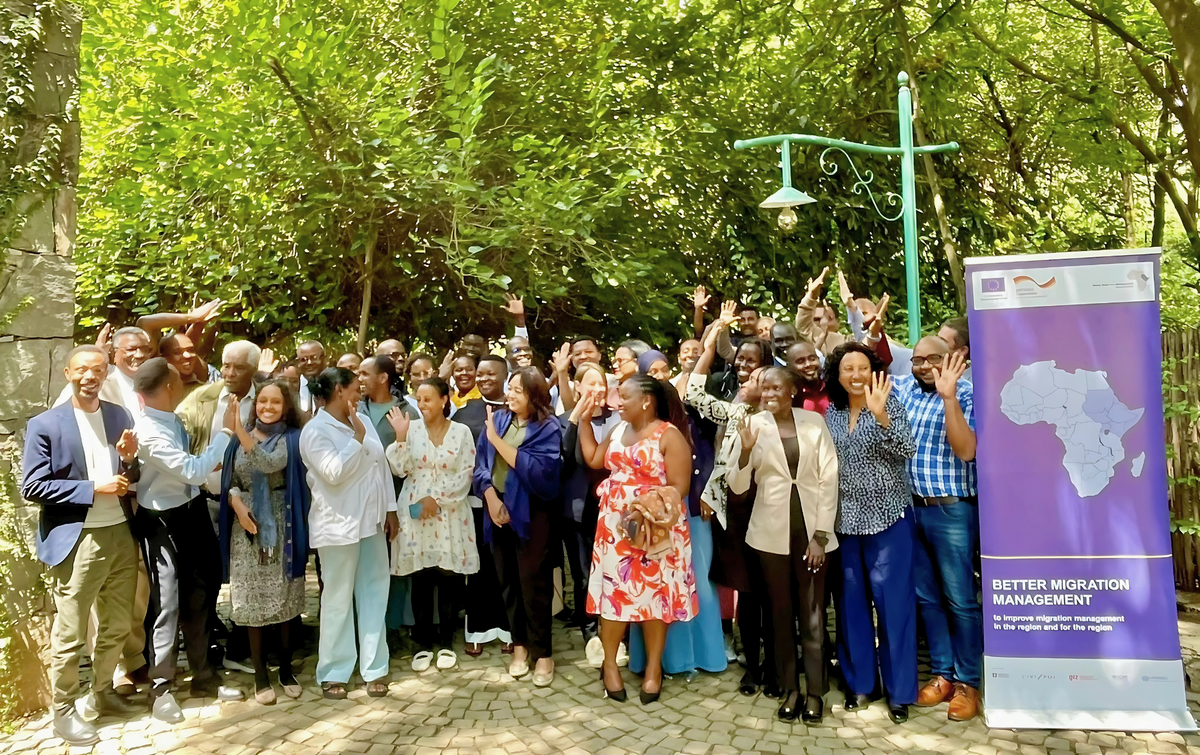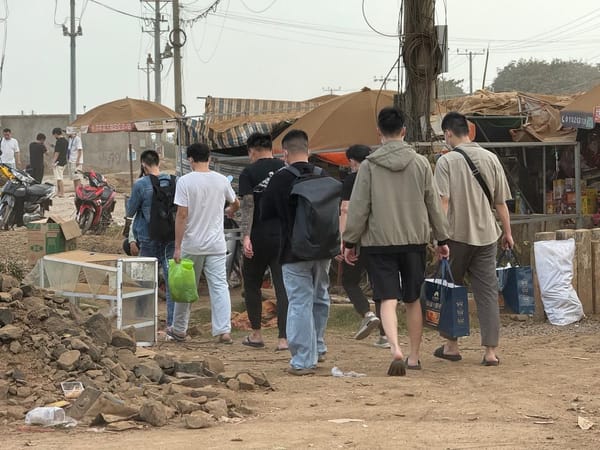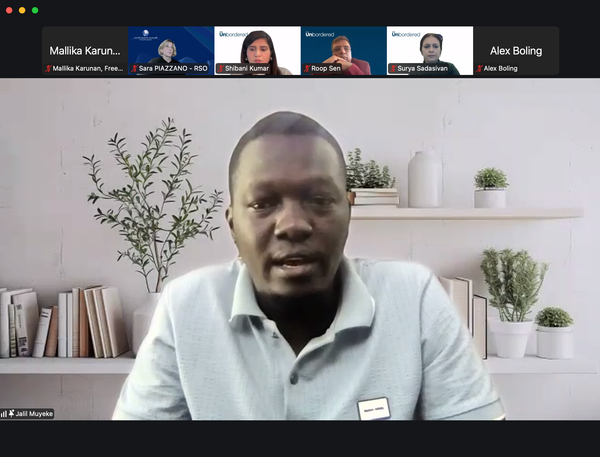East African CSOs discuss impact and sustainability at their annual forum
EHAAT members meet to review progress and plan future initiatives, UNODC highlights weak legal responses to forced criminality in ASEAN states, and Ghanaian authorities rescue trafficking victims lured abroad by football contract promises.

East Africa’s annual Regional CSO Forum to Promote Safe and Fair Migration took place last month in Bishoftu, Ethiopia, with the aim of strengthening cooperation among organizations and enhancing efforts to protect victims of trafficking and vulnerable migrants. Hosted by the Better Migration Management (BMM) Programme and supported by the Deutsche Gesellschaft für Internationale Zusammenarbeit (GIZ), the event brought together civil society organizations (CSOs) from the East and Horn of Africa Anti-Trafficking (EHAAT) Network, representing countries including Djibouti, Ethiopia, Kenya, Somalia, South Sudan, and Uganda.
This year’s event provided an opportunity to reflect on the implementation of EHAAT’s three-year Sustainability Roadmap, which supports the group’s progress towards organizational independence. Discussions also focused on emerging trends and funding gaps and included the launch of the EHAAT website, the presentation of findings from the Regional Routes Mapping 2025 project, and reviews of the EHAAT Communication Strategy and Resources Mobilisation Strategy (RMS).
Crucially, the Forum also resulted in clear commitments and next steps, with EHAAT members translating shared learning into national-level action plans, joint advocacy strategies, and resource mobilization activities that will enhance both network-wide coordination and local-level impact.
To start the proceedings, CSO coalitions shared updates from the past year, while GIZ presented recent developments in its regional CSO support, including business training sessions which reached 262 participants in Ethiopia, Kenya, South Sudan, and Uganda. In a self-reported assessment, 75 per cent of participants who had a business reported they subsequently saw their income increase. BMM further implemented a three-day training on the inclusion of survivor voices in Ethiopia, Kenya, Somalia, South Sudan, and Uganda, and supported members in representing EHAAT at the Africa Regional Review for the implementation of the Global Compact for Migration in Addis Ababa.
Following this, Freedom Collaborative facilitated a session addressing trafficking for forced criminality, which included field insights on trafficking for online scamming in Southeast Asia. The presentation highlighted cases involving Ethiopian nationals, and covered the journeys of trafficked individuals, their experiences in compounds, and the process following rescue. Challenges related to repatriation were discussed, including high costs and the limited presence of embassies in Southeast Asia. Participants from Uganda and Ethiopia also shared their experiences of working with trafficking victims who had returned from scam compounds. The issue was further explored in a working group session, which led to EHAAT members agreeing to host monthly meetings to plan joint advocacy.
Trafficking from East African countries into Southeast Asian scamming compounds was also seen as an emerging trend in data collected as part of the Regional Routes Mapping 2025 project, which was facilitated by Freedom Collaborative and BMM with contributions from EHAAT members. In reviewing the project’s findings, participants discussed how the provision of legal services can improve case outcomes, yet many CSOs reported having only one staff member with legal training to support victims. To address this, BMM will explore the establishment of a regional peer group for lawyers and paralegals to share experiences and consult on cases. CSOs discussed other concrete applications of the mapping, including use of the data to support parliamentary advocacy (South Sudan), survivor-centered programming (Kenya), and national rollout events (Uganda).
Freedom Collaborative further led a session on the RMS, which was developed by regional CSOs and outlines EHAAT activities that require funding. Members discussed ideas for future fundraising initiatives and made plans for additional activities to measure impact and reach potential donors.
During the Forum, members were introduced to the newly created EHAAT website, which will enable them to more easily keep up to date with activities, access resources, and share information. The website features a public-facing section with information about the network, its mission and achievements, a blog with regular updates, and a members-only portal with internal resources and a document library, which Forum participants learned how to use. This platform also supports greater self-reliance and long-term sustainability by providing a central hub for coordination, documentation, and visibility.
Looking to the future, members discussed priorities for next steps and follow-up activities, including the development of a comprehensive Strategic Plan for the EHAAT Network and a webinar to address funding challenges and sources. EHAAT members were also invited to join Freedom Collaborative’s Trafficking for Forced Criminality Response Working Group, which brings together frontline organizations and relevant private sector actors.
The Forum’s thematic working groups also generated targeted commitments: a regional best-practices call on alternatives to migrant detention; a child trafficking awareness campaign; and gender-responsive interventions and storytelling informed by mapping data and survivor voices.
These commitments reflect how the Forum not only facilitates dialogue but also strengthens the capacity and impact of individual CSOs working in highly diverse and complex contexts.
Here’s a roundup of other noteworthy news and initiatives:
This new publication by the United Nations Office on Drugs and Crime (UNODC) examines the ways in which ASEAN countries apply counter-trafficking legislation to address forced criminality, particularly scam operations. Through analysis of 15 criminal cases, it highlights challenges such as weak evidence use, inconsistent application of the non-punishment principle, and limited prosecution of high-level perpetrators, offering ten recommendations to strengthen legal and institutional responses.
Torture is being used systematically as a method of exploitation and control along the Mediterranean migration route, often amounting to trafficking. According to a new report by Médecins Sans Frontières, survivors describe severe abuse, especially in Libya and other so-called “safe” countries, with long-lasting physical and psychological impacts.
Ghanaian authorities, in coordination with Interpol and the Nigerian police, have rescued 76 trafficking victims lured to Nigeria with false promises of football contracts and jobs abroad. The victims were held in overcrowded, abusive conditions and coerced into extorting money from family members and recruiting others, highlighting a trafficking model that exploits dreams of opportunity through fraud and psychological manipulation.
This blog article by the Global Initiative Against Transnational Organized Crime (GI-TOC) discusses the ways in which cyber-scam syndicates are systematically using air travel to traffic victims, with alarming gaps that suggest institutional negligence or complicity, such as handlers accessing secure airport areas. Despite official commitments, the aviation sector remains a major weak point in trafficking prevention, as frontline staff often lack the training and tools needed to identify and disrupt these highly organized operations.
This essay published in Global China Pulse, offers rare insight into the methodological process involved in researching cyber-scam trafficking and exploitation in high-risk settings such as Cambodia’s scam compounds. It powerfully illustrates how fear, coercion, and moral ambiguity shape both access and trust-building in the field, underscoring the need for long-term engagement, trauma-informed ethics, and reflexivity when working with victims who may also be entangled in criminal systems.
The Inter-Agency Coordination Group against Trafficking in Persons (ICAT) is hosting a webinar on the ways in which trafficking intersects with other forms of organized crime. Titled “The Deadly Nexus: Terrorism, Firearms Trafficking and Trafficking in Persons,” the session will take place on 24 July 2025 at 15:00 CEST and will feature expert insights on these interconnected issues.




